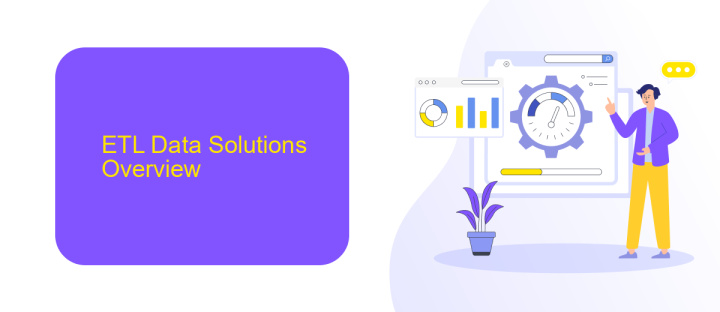ETL Data Solutions
In today's data-driven world, businesses rely heavily on efficient data management to gain insights and drive decision-making. ETL (Extract, Transform, Load) Data Solutions play a crucial role in this process by seamlessly integrating diverse data sources, transforming raw data into valuable information, and loading it into data warehouses. This article explores the significance, benefits, and best practices of ETL Data Solutions for modern enterprises.
Introduction
ETL (Extract, Transform, Load) data solutions are critical for businesses aiming to harness the power of their data. These processes facilitate the extraction of data from various sources, its transformation into a usable format, and the loading of this transformed data into a target database or data warehouse. ETL solutions ensure that data is accurate, consistent, and accessible, enabling informed decision-making and operational efficiency.
- Extract: Gathering data from multiple sources.
- Transform: Converting data into a usable format.
- Load: Inserting transformed data into a target system.
Integrating ETL processes can be complex, but services like ApiX-Drive simplify this task. ApiX-Drive allows seamless integration between various applications and data sources, automating data workflows and reducing manual effort. By leveraging such tools, businesses can streamline their data management processes, ensuring timely and accurate data flow across systems.
ETL Data Solutions Overview

ETL (Extract, Transform, Load) data solutions are essential for businesses that need to consolidate data from various sources into a single, unified view. These solutions enable the extraction of data from multiple systems, the transformation of this data into a consistent format, and the loading of the transformed data into a target database or data warehouse. This process ensures that businesses have access to accurate, up-to-date information, which is crucial for making informed decisions and driving growth.
Modern ETL solutions often integrate with a wide range of data sources and platforms, simplifying the process of data consolidation. Services like ApiX-Drive can streamline these integrations by providing automated data transfer between different applications without requiring extensive coding or technical expertise. By leveraging tools like ApiX-Drive, businesses can efficiently manage their data workflows, reduce manual effort, and ensure that their data is always reliable and ready for analysis.
Key Features and Benefits

ETL Data Solutions offer a comprehensive approach to managing and transforming your data, ensuring it is clean, reliable, and ready for analysis. These solutions streamline the process of extracting, transforming, and loading data from multiple sources into a centralized repository.
- Scalability: Handle large volumes of data effortlessly, ensuring your system grows with your business needs.
- Automation: Reduce manual intervention with automated workflows, saving time and minimizing errors.
- Integration: Seamlessly connect with various data sources and platforms, including services like ApiX-Drive, which facilitate easy integration setup.
- Data Quality: Ensure high data quality with built-in validation and cleansing processes.
- Real-Time Processing: Gain insights faster with real-time data processing capabilities.
By leveraging ETL Data Solutions, businesses can enhance their data management strategy, leading to more informed decision-making and operational efficiency. Integration services like ApiX-Drive further simplify the process, enabling seamless connectivity across diverse systems and applications.
Challenges and Considerations

Implementing ETL data solutions can be a complex and challenging task. One of the primary challenges is ensuring data quality and consistency throughout the entire data pipeline. Data from various sources often comes in different formats and structures, which necessitates extensive data cleaning and transformation processes.
Another significant consideration is the scalability of the ETL system. As data volumes grow, the ETL processes must be able to handle larger datasets efficiently. This often requires robust infrastructure and optimized algorithms to maintain performance and reliability.
- Data Quality and Consistency
- Scalability and Performance
- Integration with Multiple Data Sources
- Security and Compliance
- Cost Management
Integration with multiple data sources can be streamlined using services like ApiX-Drive, which simplifies the process of connecting various applications and automating data workflows. Ensuring security and compliance with data regulations is also crucial, as is managing the costs associated with maintaining and operating the ETL infrastructure.
Conclusion
In conclusion, ETL data solutions play a pivotal role in transforming raw data into valuable insights, enabling businesses to make informed decisions. By efficiently extracting, transforming, and loading data, organizations can streamline their operations and enhance data accuracy. The integration of advanced tools and services, such as ApiX-Drive, can further simplify the process, offering seamless connectivity between various data sources and destinations.
As the demand for real-time data processing grows, adopting robust ETL solutions becomes increasingly essential. Leveraging services like ApiX-Drive not only accelerates data integration but also ensures scalability and flexibility, catering to the evolving needs of modern enterprises. Ultimately, the successful implementation of ETL data solutions can lead to improved business performance, driving growth and innovation.
FAQ
What is ETL in data solutions?
Why is ETL important for businesses?
How often should ETL processes be run?
What are some common challenges in ETL processes?
How can automation tools help with ETL processes?
Apix-Drive is a universal tool that will quickly streamline any workflow, freeing you from routine and possible financial losses. Try ApiX-Drive in action and see how useful it is for you personally. In the meantime, when you are setting up connections between systems, think about where you are investing your free time, because now you will have much more of it.

